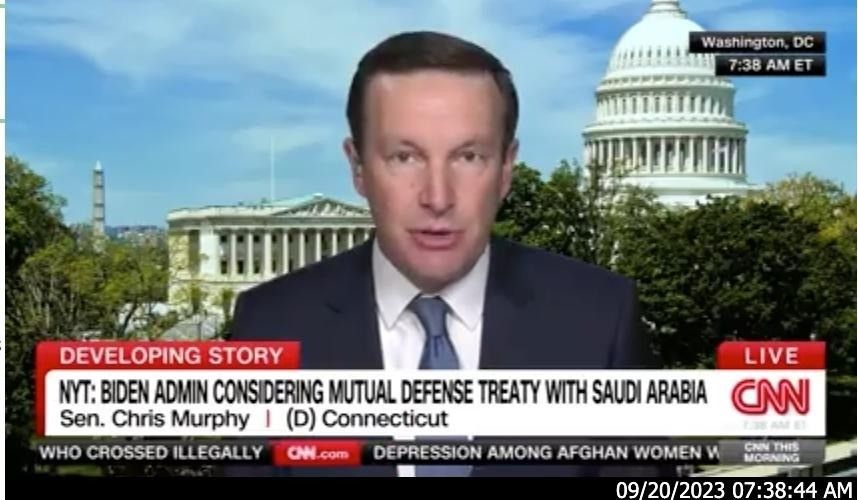Sen. Chris Murphy (D-Conn.), one of the strongest critics of Saudi Arabia in the Senate, raised concerns Wednesday morning about the possibility of offering Riyadh a security guarantee in exchange for the normalization of relations with Israel.
Appearing on CNN, Murphy said that he supported the idea of the Biden administration brokering a deal in the Middle East, saying it would be “good for the United States if there is peace between the Gulf and in particular between Saudi Arabia and Israel,” but questioned the price that Washington is willing to pay to accomplish that objective.
Murphy ticked off a list of human rights abuses that Saudi Arabia has been linked to, specifically the murder of journalist Jamal Khashoggi and the recent reported killing of hundreds of migrants crossing over the country’s border with Yemen. Under Crown Prince Mohammed bin Salman’s leadership, Saudi Arabia also launched the war on Yemen, which continues to be one of the greatest humanitarian disasters in the world today. In 2018, Murphy was one of the lead co-sponsors of a War Powers resolution that would have ended the United States’ involvement in that war.
“Is this the kind of stable regime that we should commit American blood to defending?,” asked Murphy on CNN.
In separate comments to reporters on Wednesday, Murphy noted that “there’s a reason why we generally only sign up countries for defense treaties with the United States who share our values.”
The New York Times reported on Tuesday that the Biden administration was considering modeling the agreement with Riyadh after defense treaties with Asian allies Japan and South Korea. “Under such an agreement, the United States and Saudi Arabia would generally pledge to provide military support if the other country is attacked in the region or on Saudi territory,” reports the Times. “Crown Prince Mohammed bin Salman, Saudi Arabia’s de facto ruler, regards a mutual defense agreement with the United States as the most important element in his talks with the Biden administration about Israel.”
Murphy is skeptical of such an arrangement. “I would be very wary of committing the United States, through a treaty, to the defense of Saudi Arabia,” he said.
Many Americans agree with Murphy’s assessment, according to a recent poll from the Quincy Institute for Responsible Statecraft. Sixty percent of Republican respondents and 54 percent of Democrats said that offering a defense pact to Saudi Arabia would be a “bad deal for the U.S. and there is no justification for committing U.S. soldiers to defend Saudi Arabia.”
Murphy said that he would wait until he saw details to issue a final judgment on the deal, and told Jewish Insider that he had extensive conversations with the Biden administration about “what I think would constitute a good deal, and what would be a bad deal for the United States.”- It's a bad idea for Biden to broker Saudi-Israeli normalization ›
- How did MBS shrug off 'pariah status' and put the US on the back foot? ›
- Five years after Khashoggi's murder, MBS is laughing - Responsible Statecraft ›














